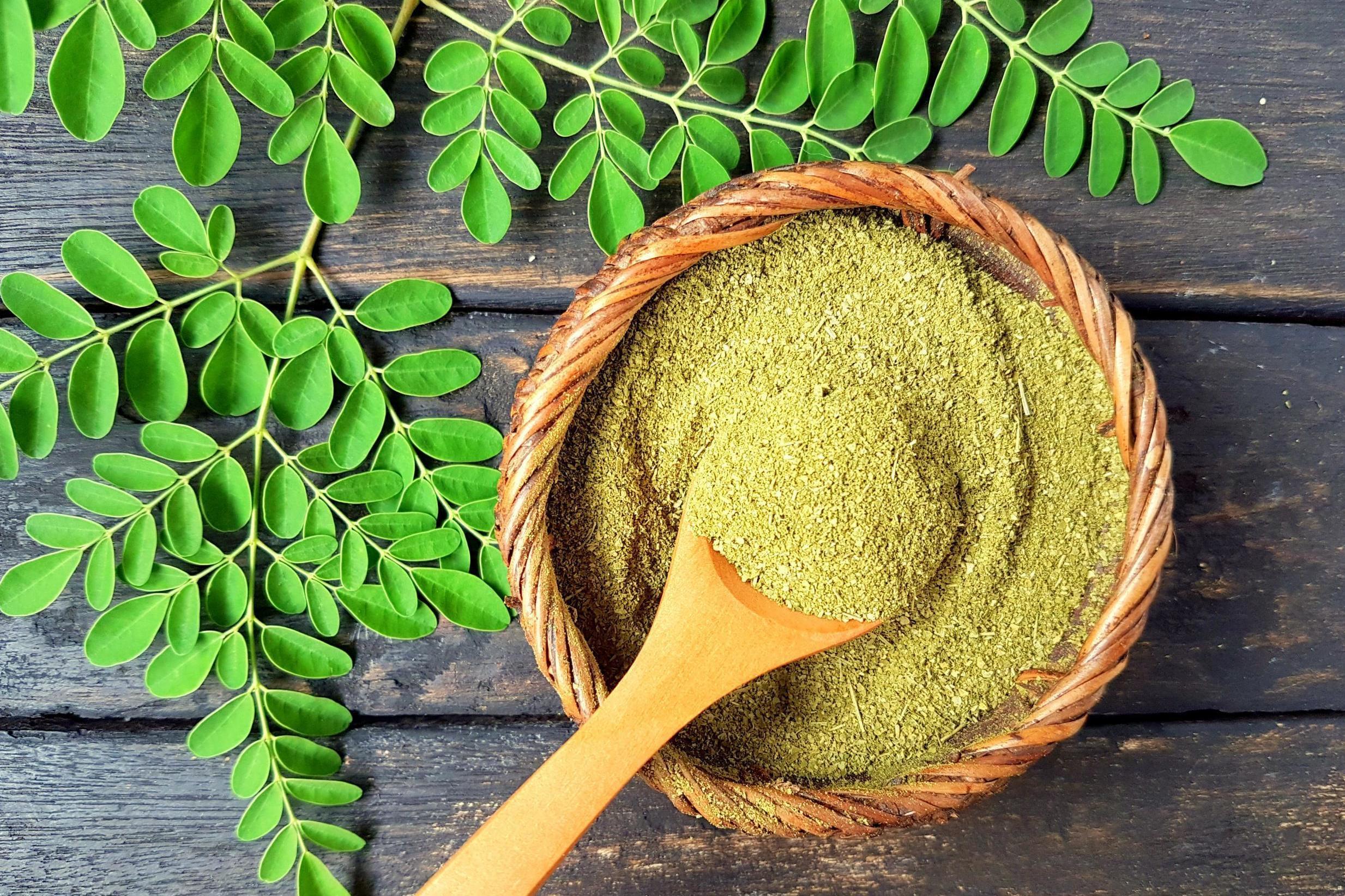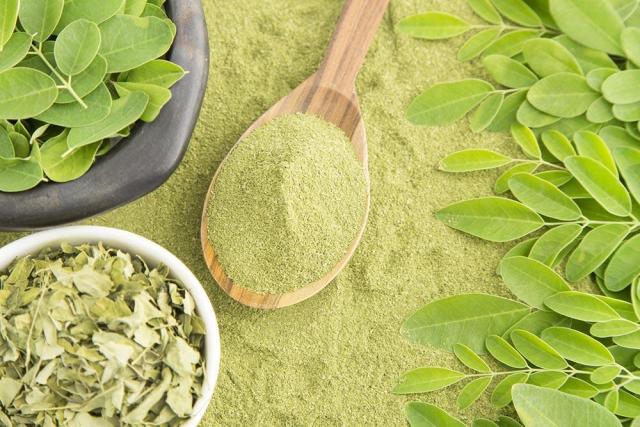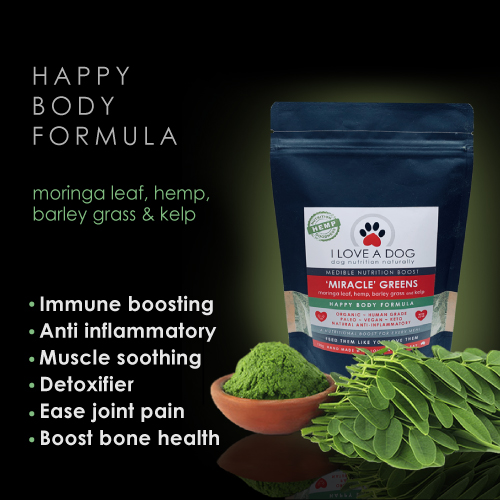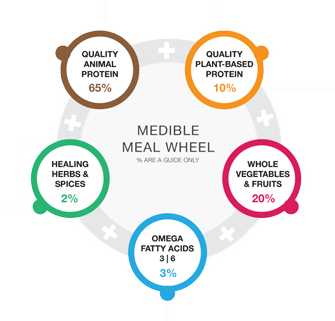Moringa
Experts Say…
Moringa Oleifera provides 36 natural anti-inflammatory agents, 46 antioxidants and all essential amino acids that help protect cells from free-radical damage.
Experts Say…
Moringa Oleifera provides 36 natural anti-inflammatory agents, 46 antioxidants and all essential amino acids that help protect cells from free-radical damage.

- 10 times the Vitamin A of Carrots
- 12 times the Vitamin C of Oranges
- 17 times the Calcium of Milk
- 15 times the Potassium of Bananas
- 25 times the Iron of Spinach
- 9 times the Protein of Yogurt
Moringa the ‘Miracle’
Moringa is known as ‘the miracle tree’ for its intense nutrient profile and the health benefits of all parts of the plant (leaves, bark, roots, seeds). It is rich in antioxidants, proteins, vitamins, all essential amino acids, flavonoids, fibers, minerals, chlorophyll, beta carotene and phenols which help strengthen immunity and reduce inflammation.
It is particularly admired for its anti-inflammatory effects and high nutrient levels, which is what I initially found particularly appealing. There is also a lot of positive research, albeit mostly in animal models (e.g. rats) or petri dishes, indicating significant impacts on cancer.
Why we love it and think you should too:
- Adding Moringa to your dog’s diet ensures they are getting all amino acids and the full spectrum of nutrients. Perfect for home made meals or to boost commercial diets.
- Moringa is a natural anti-inflammatory that helps soothe injuries, allergies, arthritis and digestion and more.
- Whether boosting immunity to cancer or soothing inflammation for arthritis, or both, Moringa is a fantastic foundation for any dog’s meal.
- The World Health Organisation (WHO) gives Moringa to new mothers to boost the nutrient profile of their breast milk making it also great for dog mums with new puppies.
I offer this information to assist you to
boost your dog’s nutrition and health as quickly as you can.
It is not medical advice but is the result of deep research.
Please discuss with your holistic vet.
Good luck and keep shining bright. Love, Donna x
Potential health benefits of Moringa
Anti-inflammatory | Anti-oxidant | Anti-diabetic | Anti-cancer | Anti-tumoural
Recipes
Some Reading
Some Research
Antiproliferation and induction of apoptosis by Moringa oleifera leaf extract on human cancer cells – Food and Chemical Toxicology Journal, Volume 49, Issue 6, June 2011. This study aimed to review the anti-proliferative and apoptosis powers of Moringa leaf extract on a strain of human cancer cells at varying dosage levels and found those powers to be ‘strong’. As such they determined that Moringa leaf extract “has potential for cancer chemoprevention and can be claimed as a therapeutic target for cancer”.
Health Benefits of Moringa oleifera – Asian Pacific Journal of Cancer Prevention, 15(20):8571-6, November 2014. This literature review from scientists in Malaysia affirms that science is catching up with Moringa’s anecdotal evidence of therapeutic benefits in many cultures and communities over many centuries. Different parts of the plant have been found to have anti-fibrotic, anti-inflammatory, anti-microbial, anti-oxidant, anti-hyperglycemic, anti-tumour and anti-cancer properties, and therefore the authors conclude Moringa has numerous applications in the ‘medicinal field’.
A potential oral anticancer drug candidate, Moringa oleifera leaf extract, induces the apoptosis of human hepatocellular carcinoma cells – Oncology Letters, 10(3): 1597–1604, September 2015. This study built on the previous positive research results of Moringa and specific human cancer cells and applied Moringa leaf extract orally to specific human lung and liver cancer cells. The results were ‘significant’ and ‘support the potential of soluble extracts of M. oleifera leaf as orally administered therapeutics for the treatment of human liver and lung cancers.’
Soluble Extract from Moringa oleifera Leaves with a New Anticancer Activity – PLOS One, 9(4): e95492, April 2014. This study from Korea also looked at the therapeutic cancer potential of the water soluble leaf extract on human lung cancer cells as well as others. They report that the extract not only “greatly induced apoptosis, inhibited tumor cell growth, and lowered the level of internal reactive oxygen species (ROS)” but also “showed greater cytotoxicity for tumor cells than for normal cells, strongly suggesting that it could potentially be an ideal anticancer therapeutic candidate specific to cancer cells”.
Moringa Oleifera Statement – Memorial Sloan Kettering Cancer Center, December 2017. This summary from conservative cancer establishment Memorial Sloan Kettering Cancer Center notes the positive results of numerous studies but calls for more research in clinical studies. It also notes potential adverse reactions and negative side effects, however interestingly these are largely contradicted in the safety and efficacy review published in the Phytotherapy Research journal in 2015 (see below).
Review of the Safety and Efficacy of Moringa oleifera – Phytotherapy Research Journal, Vol 29, Issue 6, June 2015. This paper reviews the animal and human studies researching the potential therapeutic effects of Moringa plant components and extracts. Of the relatively few human studies no adverse reactions were apparently reported, nor from the noted wide use as a food and natural therapeutic by traditional communities for some centuries. Adverse effects were noted at extremely high doses with safe dosage thresholds based on body weight established.
More ingredients to fight cancer
Please Note:
The information on this website is presented for educational purposes only. It is not intended as a substitute for the diagnosis, treatment, or advice of a qualified, licensed medical professional. The facts presented are offered as information only, not medical advice, and in no way should anyone infer that we are practicing medicine. Seek the advice of a medical professional for proper application of this material to any specific situation.
No statement on this website has been evaluated by the Therapeutic Goods Association or the Australian Pesticides and Veterinary Medicine Authority. Any product mentioned or described on this website is not intended to diagnose, treat, cure, or prevent any disease. We recommend that you do your own independent research before purchasing anything. However, we bring this information to you in good faith, after lots of research, with an open heart and good healing vibes. Our mission is to help you and your dog. Feel free to get in touch. Wishing you both much health, happiness and belly rubs.



















